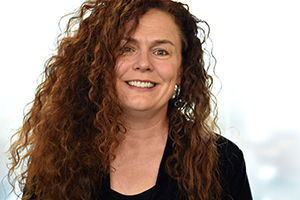St. Cloud State University faculty and student researchers are studying the social impacts of sustainable agriculture practices through a five-year, $10 million grant from the USDA National Institute of Food and Agriculture as part of a multi-state team of researchers.
The project, led by Valentin Picasso at University of Wisconsin-Madison, is an effort to study diverse perennial forage systems and to promote their adoption across the United States. It involves a diverse, transdisciplinary team of more than 50 researchers and stakeholders from 23 universities, two USDA-Agricultural Research Service centers, as well as 12 farmer organizations, industry groups, non-governmental organizations and government agencies.
“The prevailing agricultural systems in the U.S. are dominated by annual crop monocultures that lack resilience to extreme weather, are challenged by soil erosion and other environmental issues,” says principle investigator Valentin Picasso, associate professor in the UW–Madison Department of Agronomy in a UW-Madison release. “Through this new project, we hope to promote the transformation of the landscape to be more resilient, by integrating more perennial crops and forages with livestock.”
SCSU to study social aspects
St. Cloud State’s efforts led by Sociology professor Dr. Ann Finan are looking at what the barriers are to farmers adopting perennial forage systems and how those barriers vary by social characteristics like gender, class, race, ethnicity and culture.
“Our research questions ask what do those different groups of farmers need in order to implement these systems,” Finan said. “And how can we design policy and economic systems that are ecologically, socially and economically sustainable.”
St. Cloud State is committed to being a university of teacher-scholars through the It’s Time initiative where faculty members integrate their research into new ways of teaching in the classroom and involve students in research at the undergraduate level.
Finan is researcher with a background in sustainable agriculture and sociology. Her background and her position as the faculty co-director of the SCSU Survey Research Center made her and St. Cloud State a good match for the broader team.
“This grant gives our students an opportunity to see this applied social science research process firsthand,” Finan said. “We expect our faculty and students to be involved in not only the data collection process, but also in analyzing, presenting and publishing around this project for several years into the future.”
The five year grant started this fall. The St. Cloud State team is studying the social aspects of the agricultural systems to try and understand the barriers and opportunities farmers face in trying to support diverse perennial forage systems.
“We’ll be working to identify ways in which women and farmers of color can be supported in adopting these more sustainable systems,” Finan said. “We’ll be looking at how these systems can help both local communities economically as well as farmers and producers. And we’ll be helping to support policy recommendations that come out of this research.”
In addition to St. Cloud State and the University of Wisconsin-Madison, the project’s management team includes faculty from Michigan State University, North Dakota State University, Oregon State University and the University of Maryland.
Supporting sustainable agriculture
The overall project is looking at supporting resilient perennial forage systems within U.S. agriculture across the United States.
Resilient perennial forage systems are a type of agriculture that integrates non-grain forages, or livestock feed, into the production cycle such as pastures, hay production or silage. Producing these non-grain forages allows for a more circular agro-ecological system on the farm, Finan said.
“Livestock convert that forage into meat, eggs, dairy or other livestock products as well as manure and fertilizer for the on-farm system,” she said. “And that allows for a much more internally cohesive agro-ecological system.”
The goals of the project are to have an impact on reducing greenhouse gas emissions in agriculture, encourage farmers to transition to more environmentally and climate friendly systems, and integrate the needs of a wide range of farmers including farmers of color, women farmers and economically-disadvantaged farmers to help them benefit from the transition to more sustainable forms of farming. In Minnesota the project is looking to connect with farm organizations, in particular those serving Native American, Hmong, and African American and African immigrant community farmers. Farm groups interested in the project can contact Finan at asfinan@stcloudstate.edu to learn how they can get involved.
The research team is beginning by recruiting 50 pairs of farmers from across the United States and compare those who are using sustainable perennial foraging with those who aren’t. Other researchers on the team will be looking at the agricultural science behind the sustainability and greenhouse gas emissions from both types of farmers, while St. Cloud State researchers and the SCSU Survey conducts surveys and focus groups with diverse populations of farmers across the United States. They will then study the data to make policy recommendations for the U.S. Farm Bill and other state and federal policies related to agriculture and rural communities.
“This will be another opportunity for students to get involved,” Finan said. “And the insights we gain from this research will go on to inform content in classes exploring the intersection of society, science and technology, as well as our environmental sociology classes.”
Perennial forage systems are important because they have reduced greenhouse gas emissions, increased biodiversity and support economic and social systems.
This project was announced Oct. 6 in a USDA news release about new awards made through the department’s AFRI Sustainable Agriculture Systems program.
“This is the time for agriculture, forestry, and rural communities to act. Together we can lead the way with investments in science and research and climate-smart solutions that feed and nourish families, improve the profitability and resilience of producers, improve forest health, while creating new income opportunities, and building wealth that stays in rural communities,” U.S. Secretary of Agriculture Tom Vilsack said in the USDA release.
This project is supported by AFRI Sustainable Agricultural Systems Coordinated Agricultural Program (SAS-CAP) grant no. 2021-68012-35917 from USDA NIFA.

